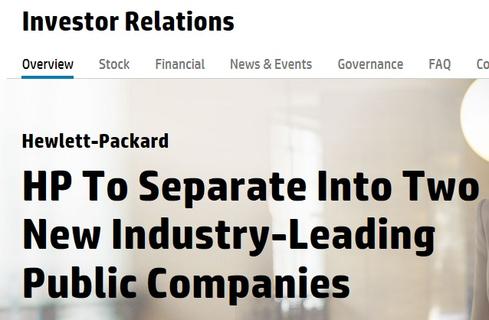HP Split: Why Two Beats One
HP has finally pulled the trigger on a split first proposed in 2011. Here's why Meg Whitman's methodical approach makes sense.


9 Innovative Products: Designers Of Things Conference
9 Innovative Products: Designers Of Things Conference (Click image for larger view and slideshow.)
HP Inc. and Hewlett-Packard Enterprise, the two companies created by splitting up today's tech behemoth, will still have mountains to climb, but HP's leadership has laid a solid, methodical plan to make the most of the company's assets.
The split of HP, announced Monday, is to be completed by the end of 2015, creating business-focused Hewlett-Packard Enterprise, in the infrastructure, software, and services business, and HP Inc., in the personal computing device and printing business.
The idea of splitting off the PC business was first proposed back in 2011 by brief-tenured CEO Leo Apotheker. But that hasty plan, bundled with the fateful move of getting out of the smartphone business and acquiring Autonomy Software for $10 billion, proved too much, too fast and was Apotheker's undoing.
[Want more on the division? Read HP Plans Split Into Two Separate Businesses.]
Meg Whitman, who succeeded Apotheker in September 2011, has succeeded by managing expectations and methodically planning and rebuilding. She laid the groundwork for this move, even as she initially vowed that the company would remain "one HP."
"Today was made possible by our turnaround," said Whitman during a Monday morning conference call with financial analysts. "The work we have done in terms of fixing our balance sheet, improving our go-to-market sales, remaking our leadership, and igniting our innovation portfolios across both businesses has made this possible."
Whitman reminded analysts that HP was a mess three years ago and needed to rebuild "as one HP." The company is now "in a position of strength," she said, and by splitting into two Fortune-50 companies, each with approximately $57 billion in revenue, both companies could become "a lot more nimble, a lot more focused." This time around investors appear to be reacting favorably, with the stock up $1.70 in early trading Monday.
HP isn't just spinning off the PC business, as Apotheker had proposed. In 2012 Whitman combined what had been separate PC and printing businesses that share consumer-centric customer bases and distribution channels. The printing side gives that business a high-margin component and financial strength to compete in what is otherwise a low-margin business. What's more, the business will retain the valuable HP brand and blue logo as HP Inc., Whitman pointed out.
Hewlett-Packard Enterprise will be a smaller company competing against giants including Cisco, IBM, Oracle, and EMC, but it will be better positioned to pursue organic growth investments and acquisitions. During Monday's conference call, Cathie Lesjak, HP's CFO, tied her mention of "material, non-public information" that could impact HP's balance sheet to the possibility of merger-and-acquisition activity.
"We have worked hard to improve our balance sheet, and as a result we have more flexibility around M&A," Lesjak said. "We will be actively looking at M&A throughout [2015]."
It was recently revealed that EMC had been in talks about a possible merger with HP, but those talks broke down. It could be that HP wanted to split the business first before consummating such a mega deal. EMC is not dissimilar to HP; both compete in the hardware and software business. However, EMC has a stronger software component than HP has managed to build in recent years.
The pace of change in technology has been HP's biggest enemy for years. Despite progress under Whitman's watch, the company that will become HP Inc. is still behind in tablets and non-existent in the smartphone market. Hewlett-Packard Enterprise sorely needs more software, higher-value services, and a stronger cloud play if it is to become a high-margin business of higher strategic importance to midsize and large enterprises.
It will take a full year for HP to split into two separate businesses, Whitman cautioned, but it's clear that this move has been in the planning stages for a long time.
"This has been a very detailed and thoughtful process about how to roll this out," said Whitman. "Obviously when you make an announcement of this magnitude there may be some challenges, but we are all over them."
HP is not suddenly in great shape in either the PC or enterprise tech businesses, but the company's fortunes have been steadily improving in both markets. Whitman said the split will accelerate HP's progress in two separate markets. The tech market doesn't like "tortoise and hare" analogies, but as two companies, the HP tortoise will be in a better position to catch up to its competitors in each market.
Just when conventional wisdom had converged around the cloud being a software story, there are signs that the server market is poised for an upset, too. Get the 2014 State of Server Technology report today. (Free registration required.)
About the Author
You May Also Like






